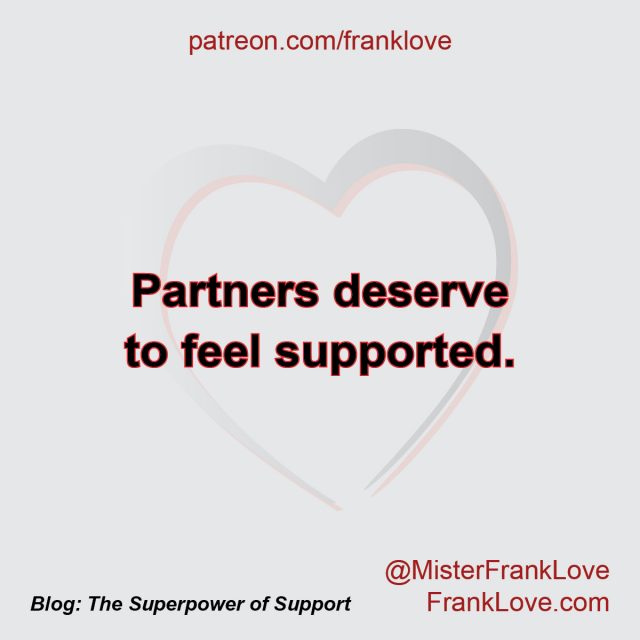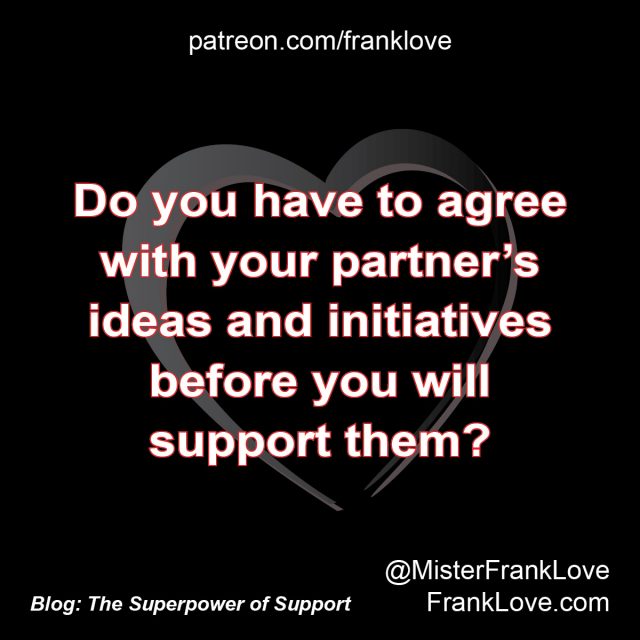Support Does Not Require Agreement

Should I support my husband’s effort when I disagree with it? Should I withhold support of my wife’s interest because I think it’s dumb?
______________
Being Unsupportive: An Example
One evening Jordan mentions to River that a vacation is in order for the two of them, and Jordan has just the place in mind. River asks, “Where is it?”
“Stowe, Vermont. I hear that it is beautiful this time of year.”
“I am not interested in going to Vermont,” River responds.
“Will you come anyway?”
“Not a chance. Find somewhere that I want to go, then we’ll talk.”
This conversation disappointed Jordan. River’s instant and seemingly flippant willingness to withhold support, for any reason, was bothersome. And River’s disposition of withholding support because of a difference in preference was befuddling.
__________________________
Why is this story worth sharing? Because it illustrates an example where one of us fell short in supporting our partner and where we can do better.
Should I Support My Partner? Should I Support My Wife? Should I Support My Husband?
As noted in the blog “The Superpower of Support,” one of our primary obligations when we are in a relationship is to take care of one another. We get to be excited about ways to do so. And we get to be interested in ways to be supportive. When our partner shares a desire where they wish for us to be included, we are given an opportunity on a platter. We get to suspend all attempts to figure out how we can support them and simply support them. It doesn’t matter if we agree with the direction or the details. We get to be supportive and help them feel supported.
I Can’t Support Something That I Disagree With
Many of us do not believe we can support our partner (or anyone else) while disagreeing with them. We believe that if there is disagreement, then there cannot be support. This has a tremendous effect on relationships and the people in them.
We Can Be Supportive When We Lack Resources
“The Superpower of Support” discussed how being supportive of our partner is important. The support benefits us, our partner, and our relationship—even when we believe we lack the resources to do so. Support often creates a super connection between partners, as creating and finding resources together can be rewarding and affirming.
We Can Be Supportive When We Think It’s a Bad Idea
We also have the opportunity and, if we accept it, the obligation to be supportive of our partner even when we think that their strategy, plan, or direction is not optimal or even flat-out wrong. When considering concepts around “having our partner’s back,” this opportunity is rich.
Are We Using Disagreement as an Excuse to Be Unsupportive?
Many of us use disagreement as a cover-up of our immediate self-centeredness. We look for and insist on finding a way out of giving our energy to others, even (and sometimes especially) our partner. “If it’s a bad idea, it’s not getting my energy,” we may say, as we start a conversation about an initiative, looking for a flaw or a reason to avoid giving our support. We may even ask our partner questions in order to find defects in their logic or strategy. We look for ways to label the idea as “bad.” This is an unloving behavior.
__________________________
We Don’t Have to Be Supportive . . . But It Helps
It is worth noting that we do not have to support our partner. We do not have to take care of them. However, doing so is a strong effort toward a successful, harmonious, and loving relationship.
Do I Need to Be Supportive of My Partner All the Time?
It is not suggested that we must support our partner in every way all of the time; they probably don’t need 100 percent, 24/7 attention to feel supported. (Though that may be a beautiful expression of love.)
Being Supportive: Examples
There are so many ways that River could have supportively responded to Jordan’s noted communication. River could have:
Compromised: “I’m down to go to Vermont this year if we can go to Hawaii next year.”
Negotiated: “Admittedly, Vermont is nice this time of year, but can we go somewhere warmer?”
Said “Yes”: One hundred percent agreement is also a viable option.
All of the aforementioned responses are forms of support. However, each of them requires a general understanding that support is important. This blog is not for the people with understanding.
This blog is for those of us who have little or no general understanding of the importance of being supportive (and definitely no general commitment of doing so). It is for those of us who lack a general willingness to be supportive. It is for those of us who justify our lack of support with “disagreement.”
How Can I Be Supportive Even If I Disagree?
If we are hiding our unsupportive disposition with justifications related to whether the idea is bad, unsound, unrealistic, or dumb, let’s:
- Acknowledge Our Pattern
The first of the twelve steps in any of the “Anonymous” (Alcoholic Anonymous, Narcotics Anonymous, etc.) programs is admitting that we have a problem. By acknowledging that we have a problem, we are humbling ourself to the process of solving it. We acknowledge that we are on autopilot, and it isn’t working. It’s not getting us where we want to go. We can no longer act as though the things we are doing are ok. They are not. We are not ok. In some way or form, we are hurting.
When we acknowledge that we have a problem, we are also acknowledging that we are in a pattern. We are acknowledging that we are working from programming. Once acknowledged, we get to change our pattern/programming. This often requires assistance.
- Apologize
When we are working from our pattern and our programing, we often hurt and insult people. Circle back to the people you may have offended and apologize for the lack of support to date. To give our partner an effective apology, check out the blog “I’m Sorry That You Feel That Way.”
- Say “Yes”
Now that we have apologized for our lack of support to date, let’s turn our lack of support into support and our Nos into Yeses. Where we used to say no, let’s practice saying yes.
- Laugh and Have Fun
Along the way toward changing our pattern(s), let’s make sure we laugh at ourself (and our patterns). It can actually be funny. Let’s laugh at how hard it is to change. Let’s laugh at how automatic our programming has been. And let’s laugh at how stubborn we used to be.
The actions that are suggested are precipitated by an admission that says, “I want my partner to feel supported.”
Is It Healthy to Give My General Support?
My father occasionally reminds me, “If you are in a battle and have to look back to see if you have support, you don’t have it.” The support we have for our partner gets to be unequivocal before it’s needed. Please consider boosting your partner with your unequivocal support beforehand.
Are There Bad Ideas? Are There Dumb Ideas?

It is worth noting that there are some crazy ideas. There are bad decisions. There is no question about that. Ideally, weeding out the people who will have these crazy ideas and make these bad decisions occurs in the dating phase. Juxtapose this with creating a culture that makes us our partner’s top advisor, and we will have a supportive system of encouragement and accountability. This is different from a convenient system of negation.
Check the Tendency to Evaluate the Idea Beforehand
The next time our partner asks for our participation or support, let’s forgo (or at least check) our tendency or desire to first evaluate the worthiness of their project and just dive in and support them with a hearty “Let’s see how we can make this happen,” just like we want them to support us. That’s loving.
Keep Rising,
Frank Love
Watch Frank Love’s presentation “The Act of Caring.”
Subscribe to receive Frank’s weekly blog.
Become a sponsor of Frank Love and his work creating a loving cultures in our relationships with a monthly contribution of as little as $2. Sign up today at Patreon,com/FrankLove.
– – – – – – – – – – – – – – – – – – – – – – – – – – – – – – – – – –
Each week, Frank Love hosts Zoom support group meetings that assist women and men as we work to create a loving culture in our relationships. Calls occur from 7:00 p.m. to 8:30 p.m. EST and can be accessed by visiting FrankWeeklyCall.com.
- Tuesdays – Black Women: Creating a Loving Culture in Our Relationships
- Thursdays – Black Men: Creating a Loving Culture in Our Relationships
– – – – – – – – – – – – – – – – – – – – – – – – – – – – – – – – – –
Frank Love coaches individuals who are in (or wish to be in) a relationship toward creating a loving culture in their family. He is also the author of Relationship Conversations You Don’t Want to Have (But Should Anyway) and 25 Ways to Be Loving. To schedule a free consultation, contact Frank at Frank@FrankLove.com.

